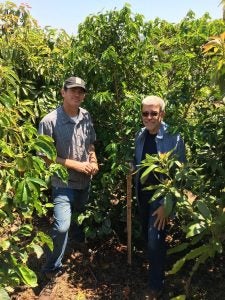
Coffea arabica is the species responsible for more than 70 percent of global coffee production and it is one of the most widely consumed crops worldwide valued at $US 21.8 billion (FAO 2012) and affecting the lives of 100 million people around the world. Coffee is mainly produced in the tropics. As a long-lived perennial, coffee plantations are susceptible to many climatic, disease and insect stresses which affect both yield and quality of coffee beans.
Although good management and pesticides can protect or curb some of the disease effects, breeding resistance to pests and diseases, and adaptation to various climates (temperature, water, soils) while maintaining quality, is the most efficient and reliable strategy for the sustainability of the coffee supply.
The U.C. Davis coffee genome project has the objective of developing a whole genome sequence of Coffea arabica as the basis to understand the genomic variation in coffee varieties and to establish a breeding program to support the future sustainability of coffee.
Initial funding for the U.C. Davis Coffee Genome Project was provided by the Suntory group, through its Suntory Global Innovation Center Limited, located in Kyoto, Japan.